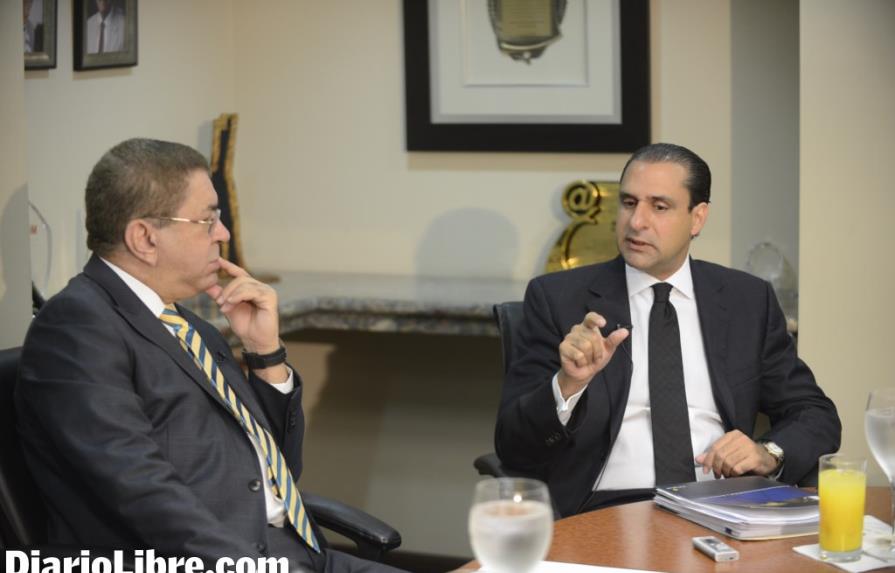Finjus: "We are going to have to protect the political parties from themselves"
They criticize that the parties remove administrative regulations

SANTO DOMINGO. The Institutionalism and Justice Foundation (Finjus) said that by the road that the legislative proposal of a Law of Parties and Political Groups was taking, it would be better that we postpone debates, (because) perhaps we are not prepared."
The executive Vice President of Finjus, Servio Tulio Castaños Guzmán, regretted that in the legislation the parties are cutting out tools of the Central Electoral Board that would supervise the use that the parties give to state funds that they receive through the budget.
"This is why we are in this, seeing what we can contribute, seeing if it is true that there is a political culture, that a legal disposition will not be enough, all this is true, but it is a starting point that our politicians understand that they are important and it would appear that we are going to have to protect them from themselves," he observed.
Interviewed on the program Dialogo Libre, a program of interviews sponsored by the Diario Libre, Castaños Guzmán pointed out that in relation to the public funds that the parties receive through the Central Electoral Board (J CE), their reports by the Chamber of Accounts reflect how they are administered.
"There are reports that the Chamber of Accounts itself has not been able to produce a report for the reason that you want," he said.
Castaños recalled that the Central Electoral Board itself complains because many times the reports that are delivered by the parties are not supported on the basis of organized accounting. He warned that without its vital parts, the legislative proposal has the reason for which it was conceived taken away, which is that of transparency in the handling of the institutions of public law, such as the political organizations.
He stressed that the parties were given a proposal in the legislative project of the law of the JCE to grant 25% to the processes of political formation of their members, 50% for administrative expenses and the remaining 25% to be spent on primaries.
However, the political parties refused and established a formula in which they say they are willing to grant no less than 10% for the programs of political formation.
The jurist considered that another worrisome point which has affected the proposal is that relating to due process within the political parties.
"The Board establishes what the punishments are to be when abuses are committed against leaders by internal organs of the political parties. The parties say no, that this has to be removed from there, that they prefer that this be part of a regulation that they are going to do inside each one of their institutions," he said.
A custom-made suit
The executive Vice President of Finjus denied that this institution of the civil society wants a Law of Political Parties drawn up as a custom-made suit, but rather seeks to play its role and the parties to play theirs.
"We as an institution of the civil society can never try from our institutions to compete not even with the political class, this would be an error, but we do as citizens have a role which we carry out from these institutions, which is to see in what way we can contribute to these processes which the Constitution orders, and that which the Congress approves is the best," he stated.
He said that it is possible to have a regulating mechanism for the major political parties and that another one can be designed with relation to the smaller parties as long as they guarantee internal democracy in these institutions.
He argued for guaranteeing the JCE the tools with which it can supervise the parties. On the other hand, he said that with relation to the simultaneous primaries there is a judicial conflict and a technical conflict.
He discarded that the Board has the capacity to supervise simultaneously the primary elections of 27 political parties that there are in the country. Castaños Guzmán was of the opinion that simultaneous primaries could be done in the minority parties, "but I don't think it can be done in the major parties."
Voter registration rolls and women's quota
Regarding the voter registration rolls by which the majority parties should govern themselves, he suggested that they be closed, due to the historical consequences of when the primaries have been celebrated with open voter lists.
He also criticized that the political parties now want to take away, in the work of the joint commission, the mechanisms that guarantee the application of a quota of 33% of the candidates be occupied by women.
They don't want private funds to be regulated
Servio Tulio Castaños Guzmán criticized that the political parties who he accused of not wanting to have private financing that they received regulated by the new law.
The executive Vice President of Finjus said that the parties have constructed some myths around private financing.
"It is not true that the businessmen do not want this to be regulated, this is not true, they want to be regulated. And another thing, because in the end it is not bad either for the businessmen to give money, because the businessmen have to invest in democracy, this is a function of the business community," he emphasized.
He said that they should create mechanisms to regulate these funds and make them transparent in order to see how they are going to be invested in democracy.
He said that Finjus wants private financing to be regulated as is done in all the countries that have laws of political parties, because every four years in the country there are always situations of scandal from "persons tied to organized crime contaminating the political processes, this is a reality, and this will be one way to see how we can go about getting rid of it."
He said that many times this wastefulness and "plutocracy" goes against local leadership, and therefore it has to be regulated.
The executive Vice President of Finjus, Servio Tulio Castaños Guzmán, regretted that in the legislation the parties are cutting out tools of the Central Electoral Board that would supervise the use that the parties give to state funds that they receive through the budget.
"This is why we are in this, seeing what we can contribute, seeing if it is true that there is a political culture, that a legal disposition will not be enough, all this is true, but it is a starting point that our politicians understand that they are important and it would appear that we are going to have to protect them from themselves," he observed.
Interviewed on the program Dialogo Libre, a program of interviews sponsored by the Diario Libre, Castaños Guzmán pointed out that in relation to the public funds that the parties receive through the Central Electoral Board (J CE), their reports by the Chamber of Accounts reflect how they are administered.
"There are reports that the Chamber of Accounts itself has not been able to produce a report for the reason that you want," he said.
Castaños recalled that the Central Electoral Board itself complains because many times the reports that are delivered by the parties are not supported on the basis of organized accounting. He warned that without its vital parts, the legislative proposal has the reason for which it was conceived taken away, which is that of transparency in the handling of the institutions of public law, such as the political organizations.
He stressed that the parties were given a proposal in the legislative project of the law of the JCE to grant 25% to the processes of political formation of their members, 50% for administrative expenses and the remaining 25% to be spent on primaries.
However, the political parties refused and established a formula in which they say they are willing to grant no less than 10% for the programs of political formation.
The jurist considered that another worrisome point which has affected the proposal is that relating to due process within the political parties.
"The Board establishes what the punishments are to be when abuses are committed against leaders by internal organs of the political parties. The parties say no, that this has to be removed from there, that they prefer that this be part of a regulation that they are going to do inside each one of their institutions," he said.
A custom-made suit
The executive Vice President of Finjus denied that this institution of the civil society wants a Law of Political Parties drawn up as a custom-made suit, but rather seeks to play its role and the parties to play theirs.
"We as an institution of the civil society can never try from our institutions to compete not even with the political class, this would be an error, but we do as citizens have a role which we carry out from these institutions, which is to see in what way we can contribute to these processes which the Constitution orders, and that which the Congress approves is the best," he stated.
He said that it is possible to have a regulating mechanism for the major political parties and that another one can be designed with relation to the smaller parties as long as they guarantee internal democracy in these institutions.
He argued for guaranteeing the JCE the tools with which it can supervise the parties. On the other hand, he said that with relation to the simultaneous primaries there is a judicial conflict and a technical conflict.
He discarded that the Board has the capacity to supervise simultaneously the primary elections of 27 political parties that there are in the country. Castaños Guzmán was of the opinion that simultaneous primaries could be done in the minority parties, "but I don't think it can be done in the major parties."
Voter registration rolls and women's quota
Regarding the voter registration rolls by which the majority parties should govern themselves, he suggested that they be closed, due to the historical consequences of when the primaries have been celebrated with open voter lists.
He also criticized that the political parties now want to take away, in the work of the joint commission, the mechanisms that guarantee the application of a quota of 33% of the candidates be occupied by women.
They don't want private funds to be regulated
Servio Tulio Castaños Guzmán criticized that the political parties who he accused of not wanting to have private financing that they received regulated by the new law.
The executive Vice President of Finjus said that the parties have constructed some myths around private financing.
"It is not true that the businessmen do not want this to be regulated, this is not true, they want to be regulated. And another thing, because in the end it is not bad either for the businessmen to give money, because the businessmen have to invest in democracy, this is a function of the business community," he emphasized.
He said that they should create mechanisms to regulate these funds and make them transparent in order to see how they are going to be invested in democracy.
He said that Finjus wants private financing to be regulated as is done in all the countries that have laws of political parties, because every four years in the country there are always situations of scandal from "persons tied to organized crime contaminating the political processes, this is a reality, and this will be one way to see how we can go about getting rid of it."
He said that many times this wastefulness and "plutocracy" goes against local leadership, and therefore it has to be regulated.


 Federico Méndez
Federico Méndez
 Federico Méndez
Federico Méndez